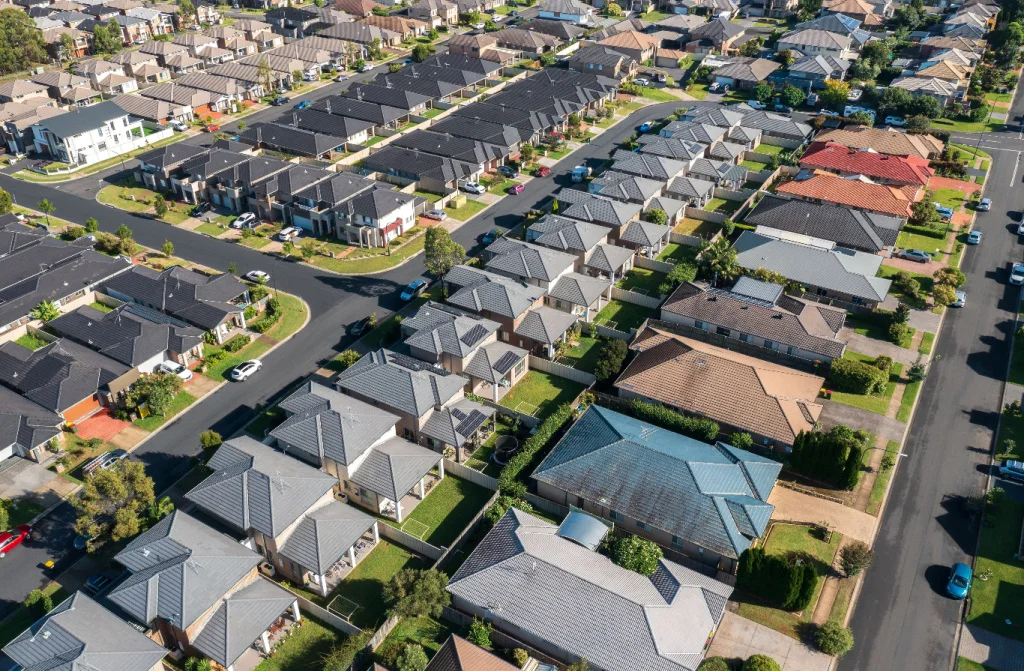Living near a buzzing US highway is a double-edged sword. It can be the dream of convenience or a nightmare of noise and pollution. But before you make the leap, let’s shine a light on the myths and truths associated with living near a busy main road. So, you’d better fasten your seatbelts! We’ll steer through the twists and turns of the cost of living, real estate value, health problems, and the endless stream of traffic. Let’s separate the myths from the truths and discover if living by the highway is a lane worth cruising in.
Table of Contents:
- Dwelling close to a freeway is a mixed bag of perks and pitfalls.
- Myth: You can get used to air and noise pollution potholes.
- Myth: The cost of living near a highway is super cheap.
- Myth: The real estate value is always affordable.
- Myth: Living close to an expressway will protect you from traffic jams and commuting woes.
Dwelling close to a freeway is a mixed bag of perks and pitfalls.
People tend to focus on the roadblocks of living next to a highway over the less-known advantages. However, the bigger picture is much more complex! You can also enjoy extraordinary perks, such as quick access to the highway, higher property values, employment opportunities, more free time with your family, and community spirit. How can you achieve these goals?
Expert representatives from the real estate agents directory firmly state that you should carefully select your future location, be more resourceful, and apply more creativity with practical solutions. They will also point out that there is more to this unique lifestyle than heavy traffic and noise pollution.
Myth: You can get used to air and noise pollution potholes.

Let’s address the elephant in the room. One of the biggest concerns about residing near a highway is the pollution – both in the air and in terms of noise. Picture this! On one side, you have the “sweet smell” of fumes dancing in the breeze. At the same time, the endless “symphony of car horns and engines” becomes the soundtrack to your daily life. It’s like trying to enjoy a picnic while someone sneezes and plays the bagpipes right next to you. In a word, it is far from a serene experience.
How severe can noise and air pollution get?
People underestimate the constant noise exposure. It isn’t just an annoyance. It can also take a toll on your health. High traffic noise levels can increase stress and disrupt your sleep patterns. Moreover, according to a Harvard Medical School study, air pollution can boost the chance of suffering cardiac arrest, especially when living within 170 feet of a major roadway. With every 300 feet closer to a roadway, people increased that risk by 6 percent. Unfortunately, pollution thrives in a highway-adjacent environment.
So, before you jump on board, ensure you’re ready to tolerate the tune of honking cars and roaring engines 24/7. Because there are no 100 percent foolproof methods to combat the hustle and bustle and air pollutants of the vehicles passing by.
Myth: The cost of living near a highway is super cheap.

Many folks assume living near a US highway is a budget-friendly option. After all, you’re close to the action, right? Well, not so fast. On the one hand, some homes near highways may have a lower price tag. On the other hand, they forget to factor in other costs. Think about the constant hum of traffic infiltrating your thoughts or the need for a good pair of noise-canceling headphones just to catch some sleep. These hidden costs can add up faster than a speeding bullet. As a result, you’ll end up with a hefty bill at the end of the month.
How do we mitigate noise pollution?
Everyone knows heightened noise levels can lead to health, most notably eardrum problems. Therefore, the question of how to reduce noise pollution is legitimate.
We recommend improving your insulation as the number one soundproofing method. Installing weather-stripping materials and double-pane windows can work. Wall-to-wall carpeting is another viable solution. Our fourth suggestion is raising a fence to absorb the most intense sound vibrations or waves. Few would consider soundproof carpet floors to lessen noise. Still, vinyl is an excellent sound-absorbing material.
Suppose you want to be meticulous in this regard. In that case, you’ll see that these alternatives come with a weighty price, especially if you combine two or more.
Myth: The real estate value is always affordable.

Now, let’s talk real estate, our favorite topic. Some people believe living by a highway is a surefire way to strike gold regarding property value. House hunters and prospective buyers suppose that every homeowner wants to get rid of their property due to the unbearable racket, constant traffic, accidents, and hard-to-breath air. Subsequently, they’re willing to cut the price.
However, the reality is more like a rollercoaster ride—full of ups and downs. We can’t make a general and valid statement about all properties near a highway. Proximity to a road can boost home value, especially for buyers looking for quick access to the main road. Yet, it can also be a deal-breaker for those seeking peace and quiet.
Property prices must be carefully examined!

Home values change depending on numerous factors. Convenience and access to nearby amenities must be considered. Then, buyers must inspect highway infrastructure and future real estate expansion projects that can boost property value, as retail development does. Suppose the prospect of purchasing a highway house intrigues you. In that case, you’ll need reliable location information. Buyers should balance convenience and a safe spot from highway noise and air pollutants.
We suggest buying an asset not too far from the highway to enjoy quick access to the main road but far enough to avoid direct contact with the noise and tailpipe emissions from trucks, cars, and buses. The ideal distance should be more than 1,640 feet away from the highway.
Myth: Living close to an expressway will protect you from traffic jams and commuting woes.

Last but not least, let’s chat about traffic. Logically speaking, the vicinity of a highway might seem like a shortcut, enabling you to beat the morning rush. But don’t count your chickens before they hatch! Most folks wouldn’t anticipate worst-case scenarios. Highways can become unpredictable beasts.
Preparing for the worst-case scenario!

If everybody believes they’re on time, they postpone leaving for work in the morning until the very last minute. And what happens next? The road gets packed with residents’ cars in the blink of an eye. Thus, maddening traffic jams ensue. Unfortunately, the morning rush can lead to accidents that will throw a spanner in the works of your daily commute. Your nightmare can become a reality. Imagine being stuck in a sea of brake lights. You can inch forward at a snail’s pace while your coffee gets cold in the cup holder. And you’ll picture your boss’s angry face waiting for you impatiently. Not the most delightful way to start your day, right?
Public transportation offers a viable solution to avoid heavy traffic and reduce perplexing commuting hours.
Final thoughts
Every buyer should take time to make such a considerable decision before first studying the market. Several perks of living close to a highway might tempt you, such as more affordable home prices, direct access to the main road, time efficiency, and advantageous connectivity.
Buying such a property can be especially attractive from a real estate perspective. As highways are essential to transportation, logistics, and the economy, homes nearby will be considered valuable assets. You can join the rental game and turn your property into Airbnb, short- or long-term rental units for businesses, entrepreneurs, or commuters. Or, you can wait for the sale until a considerable development occurs in your neighborhood and then sell it for a substantial return on investment.
However, you must know precisely what living close to a highway entails. By hiring a skilled and smart real estate agent, you can obtain all the necessary background information and see part of the popular misconceptions about dwelling in such an environment in the public eye.











